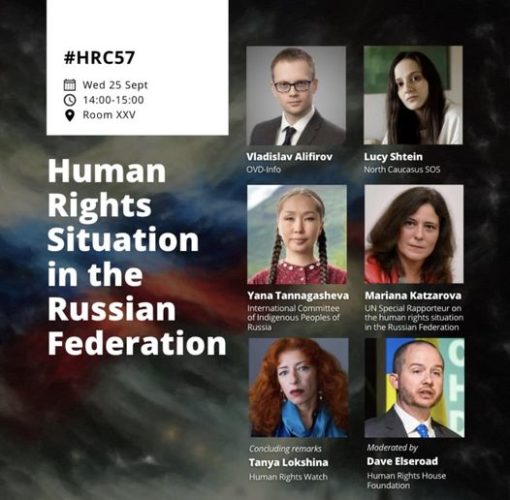
Yana Tannagasheva, activist of the Indigenous peoples’ movement, represents civil society at the 57th session of the UN Human Rights Council (Geneve). For the session, a Special Rapporteur on the Human Rights situation in Russia, Mariana Katzarova, presented her report; special attention was paid to the situation of Indigenous peoples and minorities. On September 25, during the UN HRC session, there will be a panel discussion on the rights of Indigenous Peoples.
In the interview with ADC Memorial (in Russian), Yana Tannagasheva speaks about the new wave of repression against activists defending the rights of Indigenous peoples; about the promotion of the official position of Russian authorities through the UN institutions and mechanisms created for Indigenous peoples; about the impact of the war on Indigenous communities.
- Written statement submitted by Society for Threatened Peoples, a non-governmental organization in special consultative status “Criminalisation of Indigenous Rights in the Russian Federation: 55 Organisations Arbitrarily Declared “Extremist”
From the Report of the Special Rapporteur on the situation of human rights in the Russian Federation, Mariana Katzarova:
99. Since the start of the war against Ukraine, the Russian State’s emphasis on national unity and patriotism has led to increasing attrition of a range of rights for minorities and Indigenous Peoples, from language and land rights to freedom of expression and security.
100. A lack of comprehensive anti-discrimination legislation has resulted in violent hate crimes, murder, torture and ill-treatment, especially against migrant workers from Central Asia and non-Slavic minorities. Violent hate crimes against them have increased since the March 2024 terrorist attack in Moscow. Indigenous and national minority rights organizations have been branded as “extremist”, “foreign agents” or “undesirable”, forced to close and their activists imprisoned.
101. Indigenous Peoples (by Russian legal definition, groups with fewer than 50,000 people), small-numbered Indigenous Peoples (under 10,000 people, who are exempt from conscription) and national minorities have been disproportionately mobilized, some by force, to fight against Ukraine. As a result, some small-numbered groups may face extinction from war casualties.
102. The Russian Government has not disclosed information on the ethnic composition of its army or casualties in the Ukraine war. Independent analysis shows wide ethnic disparities in fatalities, however, with minority groups approximately four times more likely to be killed in Ukraine than ethnic Russians and 100 times more likely than people from Moscow. The data suggest that Indigenous Peoples of the Russian North are suffering the greatest war losses relative to the size of their populations.
103. Indigenous Peoples are one of the most impoverished demographic groups, with social and economic development and life expectancy far below the national average. Yet in 2022, Russian authorities cut the subsidies mandated by law for Indigenous Peoples and imposed onerous and arbitrary new requirements for registration to have access to these and other benefits.
133. In May 2024, the Government requested that the Centre for Support of Indigenous Peoples of the North be deprived of its Economic and Social Council consultative status on the grounds that it lacked legal recognition in the Russian Federation. The Russian authorities closed the organization in 2019, after having designated it as a “foreign agent” in 2015.
134. The 2024 designation of the International Committee of Indigenous Peoples of Russia as “extremist” was a possible reprisal for their cooperation with the Expert Mechanism on the Rights of Indigenous Peoples and other human rights mechanisms.